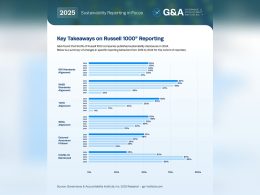As a media partner for the Asia Integrated Reporting Awards (AIRA) 2024, ESG Post had the privilege of speaking with Mr. Nantha Kumar Chandran, Chief Sustainability Officer & VP, Global Plating Operations at ENNOVI. The company was awarded Gold for Asia’s Best Sustainability Report (Private Company)—a testament to its unwavering commitment to transparency, ESG integration, and impactful sustainability reporting. In this exclusive interview, Mr. Nantha shares insights into Ennovi’s sustainability reporting journey, the challenges of sustainability disclosure, and the company’s forward-looking vision in a rapidly evolving global landscape.
Why does your company publish a sustainability report?
At our company, publishing a sustainability report is a strategic decision rooted in our commitment to transparency, accountability, and responsible business practices. This report allows us to openly communicate our sustainability initiatives to a broad range of stakeholders.
By doing so, we not only enhance our transparency and accountability but also strengthen our brand reputation and gain a competitive edge in the market. The process helps us identify and manage ESG-related risks, drive internal improvements, and support our long-term business strategy.
Moreover, sustainability reporting helps us meet investor expectations, align with regulatory and compliance requirements, and respond proactively to growing stakeholder demands for corporate responsibility and ethical conduct.
Which part of sustainability reporting did you find to be the most challenging?
Sustainability reporting is a complex and evolving field, and several aspects present considerable challenges. One of the most significant is data collection and ensuring accuracy, particularly across diverse departments and supply chains.
Calculating Scope 3 emissions is another complex task, as it involves assessing indirect emissions from sources not directly controlled by the company. Materiality assessment, which requires identifying and prioritising the issues most relevant to our stakeholders and business, also demands careful consideration and stakeholder input.
Furthermore, aligning with multiple global frameworks—such as GRI, SASB, TCFD, and now ISSB—adds complexity. Lastly, stakeholder engagement and effective communication require consistent effort to ensure our reporting reflects their concerns and expectations while remaining clear and accessible.
How has your company benefitted from disclosing sustainability performance?
Disclosing our sustainability performance has brought numerous tangible and intangible benefits. First and foremost, it has enhanced our brand reputation and strengthened customer trust, positioning us as a responsible and forward-thinking organisation.
It has also improved our risk management capabilities, making us more resilient in the face of ESG-related risks. Through transparency and targeted improvements, we’ve achieved greater operational efficiency, leading to cost savings and resource optimisation.
Additionally, our reporting aligns with global sustainability goals, contributing to a more sustainable future. It has helped deepen our relationships with stakeholders and build investor confidence, thereby improving access to capital and long-term investment opportunities.
What steps do you take to ensure that your sustainability report is reliable and credible?
We take several steps to ensure the reliability and credibility of our sustainability report. First, we have established a robust data collection and management system that ensures consistency and accuracy across all departments. We also define clear reporting boundaries and scope to maintain focus and relevance.
A comprehensive materiality assessment is conducted to identify key issues, and we ensure alignment with globally recognised standards and frameworks, such as GRI and the Integrated Reporting Framework.
To further enhance credibility, we perform internal validation and quality checks, and ensure that the report is balanced and transparent, highlighting both achievements and areas for improvement. We also commit to a process of continuous review and refinement to elevate the quality of reporting year after year.
How do you think sustainability reporting will evolve in the next five years?
Over the next five years, sustainability reporting is poised for transformative growth. We expect increased regulatory pressure, such as the European Union’s Corporate Sustainability Reporting Directive (CSRD), the SEC’s climate disclosure requirements in the U.S., and the IFRS Sustainability Disclosure Standards (S1 & S2) in the UK.
There will be a stronger push towards value chain transparency, influenced by frameworks like CSDDD, and an increasing integration of financial and sustainability reporting, reflecting a more holistic view of corporate performance.
Additionally, there will be a greater emphasis on Scope 3 emissions, double materiality, and stakeholder-centric reporting approaches. Topics like nature and biodiversity will also come to the forefront, as companies recognise the broader impacts of their operations on ecosystems.
What advice would you offer to other companies striving to enhance their sustainability reporting practices and earn recognition in initiatives like the Asia Sustainability Reporting Awards?
My advice to companies looking to elevate their sustainability reporting and gain recognition in platforms like the Asia Sustainability Reporting Awards (ASRA) is twofold.
Firstly, invest in external assurance. This lends credibility to your reporting and shows stakeholders that your disclosures are trustworthy and independently verified.
Secondly, engage in peer benchmarking and continuous improvement. Understanding industry best practices and learning from peers can help refine your strategy. Sustainability reporting is not a one-time task—it’s an ongoing journey of learning, adapting, and leading with purpose.

















